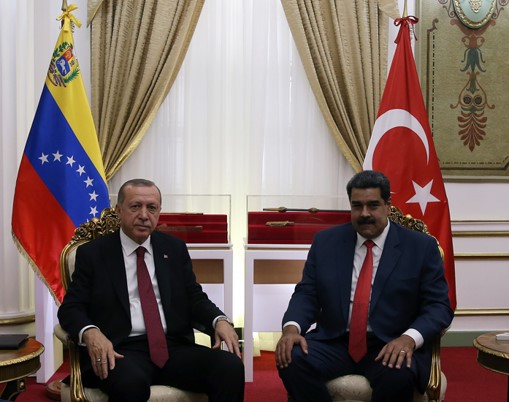Nordic Monitor
Turkey and its South American ally Venezuela have entered into a security cooperation agreement that includes carrying out joint police operations and exchanging information and experience in combatting and preventing terrorism and crime.
Despite the US government’s economic sanctions on Venezuela for human rights abuses and undermining democracy, economic and political ties between Ankara and Caracas have grown stronger. In recent years Venezuela and Turkey have exchanged visits of high level officials and signed several bilateral agreements. In that regard Venezuelan Vice President Delcy Rodríguez paid a visit to Turkey on January 24, 2020 on the occasion of the 70th anniversary of bilateral relations and met with her Turkish counterpart, Fuat Oktay, in Ankara.
In the text of the agreement, obtained by Nordic Monitor, the two countries pledge to cooperate in fighting transboundary crime, in particular crimes related to terrorism, organized crime, smuggling of migrants and the trafficking of human beings and narcotic drugs and psychotropic substances and their precursors.
According to Article 3 (b), the parties “agree to carry out joint police operations. The relevant operational procedures shall be agreed upon by the Authorities of both Parties as mentioned in Article 6.” The terms of the agreement will be executed by the Ministry of Interior on the Turkish side and the People’s Power Ministry for Interior for Venezuela in line with Article 6. It is obvious that Article 3 of the agreement could become a convenient tool for Turkish police forces to conduct operations on Venezuelan soil targeting dissidents.

The Turkish government has previously set up similar security cooperation mechanisms with other countries. For instance it agreed on a protocol with Qatar for the deployment of Turkish police units to the Gulf state during the FIFA World Cup to be held in November-December 2022 and other mega events.
Moreover, Serbia has allowed the deployment of Turkish police forces who are expected to patrol in Serbia in order to expand Turkey’s crackdown on government critics and political persecution in the Balkans.
The 12-article agreement was submitted to parliament for ratification on May 3, 2019 by Turkish President Recep Tayyip Erdoğan, who has often been criticized by his opponents for abusing criminal and terrorism investigations in order to prosecute dissidents on dubious charges of terrorism.
President Erdoğan’s letter submitted to parliament seeking approval of the agreement with Venezuela:
Similar to previous security accords, the Turkish-Venezuelan security cooperation deal also contains same ambiguous phrases that give rise to serious concerns of the possible prosecution of critics and journalists who live in the South American country given the track record of exploitation of terrorism and criminal charges by the Erdoğan government.
“In combatting terrorism, the Parties shall prevent the activities of the visual and written media organs of terrorist organizations and their front institutions operating in their territories against the other Party,” Article 2 (3.c) states, adding that “the Parties consider them as illegal organizations and take appropriate measures in this regard according to their national legislations.”
According to Article 2 (3.d), the parties will develop and implement efficient combating measures regarding persons and institutions providing financial or other support including sheltering, accommodation, training and treatment and logistic support to the terrorist organizations in their territories.
Speaking at the Turkish Parliament’s Foreign Affairs Committee last month, Deputy Director General of the Turkish National Police Erhan Gülveren, an important ultranationalist figure in Turkish law enforcement, underlined the fact that such agreements would contribute to the Turkish government’s efforts to suppress people affiliated with the faith-based Gülen movement.
The text of the security agreement is posted below:
The two countries have also committed themselves to exchanging information by monitoring the movement of technological equipment and all kinds of weapons and ammunition that could be used in the preparation and perpetration of terrorist acts with the aim of preventing the terrorist organizations from acquiring that equipment.
The agreement allows both sides to appoint liaison officers and other experts on crime to increase the efficiency of interaction and coordination of joint actions. According to the text, the party states will carry out short and long term training programs and courses and conduct projects for analyzing the nature, dynamics and forms of terrorism.
The text was signed on October 6, 2017 in Ankara by Turkish Foreign Minister Mevlüt Çavuşoğlu and his Venezuelan counterpart, Jorge Alberto Arreaza Montserrat, during President Nicolás Maduro’s visit to Ankara. The deal is valid for five years and will be automatically extended. According to the text, either party may notify the other of the intent to terminate at least six months in advance.
President Erdoğan turned against the Gülen movement after major corruption investigations in December 2013 that incriminated Erdoğan, his family members and his business and political associates. In May 2016 Turkey designated the group as a terrorist entity without any evidence that Fethullah Gülen, who inspired the movement, or people affiliated with the movement had committed any terrorist acts. Then, a coup attempt in July 2016 was carried out at Erdoğan’s direction as a pretext for an ensuing crackdown. Following the failed coup, which was called “a gift from God” by Erdoğan, thousands of Turkish citizens were forced to flee their homes due to his anti-democratic rule and a still ongoing purge of government critics.












